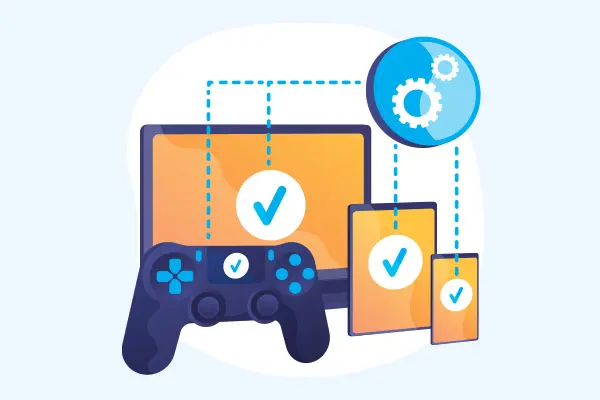Everything You Need to Know About Cross-Platform Game Development
Cross-Platform Game Development

When it comes to investing in a mobile gaming app based on a market-winning idea backed with some great technologies, cross-platform games development is lucrative idea.
However, since making a massive investment and trying your luck in one of the profitable yet saturated markets can be risky, it can also take the much-needed leap.
And to help you with that, here’s a detailed guide on everything you need to know about why cross-platform app development is a better option when it comes to developing mobile games.
Here’s everything the guide includes:
- How do cross-platform games work?
- The difference between native and cross-platform development
- Benefits of developing a cross-platform game app
- Best cross-platform development frameworks
- Popular cross-platform games
So, let’s get started.
How do Cross-platform Games work?
Cross-platform game app development is based on leveraging different software tools to build mobile game apps that use the same code base, design assets, and feature-set applicable on different devices.
developing multi-platform applications allows developers to use the same codebase to be customized and used on different devices to offer the same functionality and user experience.
Also, cross-platform game development uses different game engines, scripting languages, software libraries, and platform-specific elements to develop highly-actionable and profitable games.
The Difference Between Native and Cross-platform Development
Making a choice between native vs. cross-platform app is a crucial choice for developers and investors.
While for many, it depends on the cost, app idea, and target audience, the technical aspects of native or cross-platform app development are equally important.
This section gives a clear glimpse of the striking difference between native iOS or Android app development and cross-platform app development.
Cost
The cost of developing an app dedicated to one platform only is usually higher as compared to cross-platform applications. In addition to this, since app maintenance is also an essential aspect of the app development process, app maintenance for a native app is also higher than maintaining a cross-platform app.
Code Usability
Since native apps target a single platform and are developed dedicatedly for a device, they have minimum code usability. On the other hand, cross-platform applications offer easy portability and code reusability for multiple platforms.
UI Consistency
Native apps offer wide UI consistency since they are developed for a particular mobile OS. On the contrary, cross-platform game apps have limited UI consistency since they target multiple devices with a single code.
Why Cross-platform Development – The Benefits
As the above section specifies the differences between native and cross-platform app development, it gives a glimpse of how cross-platform app development helps developers and appreneurs make it big in the game development market.
To give a further clear idea of what are the benefits of cross-platform app development, here’s everything it offers:
- Cross-platform app development focuses on developing an app with a single codebase and deploying it to multiple platforms, thus allowing companies to reach a wider target audience.
- With reusable codes and agile app development processes, the cost of developing a game and maintaining it reduces dramatically as compared to native app development.
- Deploying and maintaining a multi-platform app is easier as the changes can be easily synced to all platforms and devices, saving additional time and money.
- The cost of developing an app for multiple platforms is also reduced as compared to developing platform-dedicated apps.
- Fixing bugs and errors in cross-platform app development is also easy since it must be fixed only once.
- The development process for multi-platform app development is quick and reduced the efforts by 50 – 80%
- Cross-platform applications offer great compatibility and allow using different plugins to integrate cloud services.
- Cross-platform development follows the “Write Once, Run Everywhere” approach; this helps in quicker app development and reduces the time-to-market with quick deployment.
- Although developing user interfaces is difficult in cross-platform game development, developers can implement uniformity with similar UI features and elements.
Best Cross-platform Game Development Frameworks
Developing a game app for multiple devices requires specific frameworks and software, enabling developers to access all the needed tools and plugins. Also, it helps entrepreneurs launch their game to market effectively.
Here are some of the popular cross-platform game development software:
1. Unity
Preferred by several top-notch game developers for cross-platform development, Unity is a popular gaming engine.
It is easy to use and has a wide user community because of its growing popularity.
After downloading it, all you have to do is choose the targeted platforms and versions of your chosen device. The framework itself provides the required SDKs by downloading them automatically.
Unity offers both 2D and 3D elements optimized for developing cross-platform mobile gaming apps.
2. Unreal Engine
Unreal Engine is one of the powerful engines that game developers use globally.
One of the striking features of the framework is that it comes with a visual scripting tool that helps in designing visual elements of the game to be used on different devices.
The feature is particularly helpful for those who don’t want to get down with C++ coding to design and develop games.
However, for developing multi-platform games, Unreal often requires some setup which includes installing SDKs separately to help with development.
3. Game Maker Studio
A highly user-friendly and feature-packed gaming engine, Game Maker Studio implements that drag and drop features to put gaming elements together and develop a game.
However, the game engine offers limited functionality but is optimal for mobile game development.
Although there is a free version available, cross-platform game development requires a professional version.
4. Godot Engine
Another free game engine with 2D and 3D development features, Godot Engine, comes in with built-in nodes, a visual editor, and common development tools.
All these and more features speed up the entire cross-platform game development process and offer easy bug fixing and enabling new features.
Also, it has a large developer community to assist in the quick learning process.
5. Solar 2D
Formerly known as Corona SDK, Solar 2D is a 2-dimensional game engine simulator. Based on programming languages like Lua, it offers varied adaptability to different gaming resolutions and ratios.
Being an easy-to-understand and implement game development language, Lua helps the team to add game elements quickly to the code with just a single line of code.
10 Popular Cross-platform Games
To give you some striking inspirations of why you should invest in cross-platform game development, here are some of the chart-busting gaming apps that are available across multiple devices:
- Fortnite
- Chess Time
- Among Us
- Muffin Knight
- Clash Royale
- Vainglory
- Ingress
- Pixel Worlds
- Fun Run 2
- Pocket Legends
Wrap Up
This rounds up our guide of why you should opt for cross-platform game development and everything you must know about it.
Since cross-platform game development comes along with a number of features and benefits; investing in it can always be a lucrative idea for all.






